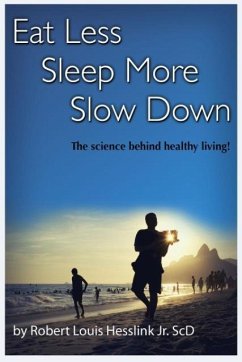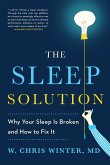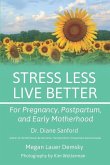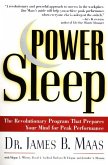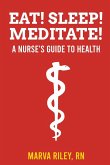Eating, sleeping and relaxing are top of mind to the average consumer. Not necessarily in that order, but people are looking for ways to improve their health and lifestyle. In his book, Eat Less, Sleep More, and Slow Down, Dr. Robert Hesslink provides a simplistic view on how to tame these major impediments to healthy outcomes. The book is a simple read with the use of research citations to support the topic at hand. The opening section introduces the reader to the reality of current global health as a function of increasing obesity and diabetes. These two health conditions alone account for almost 3% of the global gross domestic product (GDP), while in the United States being overweight and obesity cost upwards of $1.7 trillion dollars. With expenditures on healthcare so high, it is easy to understand Dr. Hesslink's call to action to reduce these costs so they can be applied to education, social services and infrastructure around the world. Not to mention, the spiraling health care costs for individuals and families. Chapter 1 focuses on the concept of dieting and the simple notion of just reducing food intake. Sounds simple enough but the why and how one reduces is of paramount importance. Dr. Hesslink outlines the basics of cellular metabolism and energy utilization, so that the reader can appreciate the nuances afforded by chronic fasting, acute daily or intermittent fasting and newer programmed dieting strategies such as the 5:2 Diet. The reader comes away with a better understanding on how to best utilize these strategies in his or her daily schedule and family life. Chapter 2 draws the reader into the importance of sleep without getting too technical on the neuroscience of sleep. A brief summary on the mechanics of brain wave activity during sleep prepares the reader for a nice review of the literature on sleep deprivation and dysfunction. Dr. Hesslink follows with new material showing how sleep schedule and off-cycle work shifts play a big role in individual health. By the end of the chapter, the reader is ready to take full advantage of the benefits of a good sleep. Chapter 3 brings together yoga and meditation with the trendy buzz of mindfulness for the purpose of demonstrating the importance of slowing down. Dr. Hesslink provides a nice summary of current research on yoga and meditation showing benefits in cardiovascular disease, weight management and mental focus. And finally, the afternoon siesta is shown to be a sound strategy for improving performance for individuals suffering from sleep disruption and off-cycle work schedules-not to mention people just looking to slow down. The final chapter brings the three concepts of eating, sleeping and relaxing together with an action plan to help the reader prepare and monitor their progress. The reader comes away with an improved knowledge on healthy living and a greater appreciation for the research process in showing benefit. The book can serve as a quick guide for continued understanding on topics that will continue to be top of mind as our world struggles with increasing healthcare expenses and global obesity.
Hinweis: Dieser Artikel kann nur an eine deutsche Lieferadresse ausgeliefert werden.
Hinweis: Dieser Artikel kann nur an eine deutsche Lieferadresse ausgeliefert werden.

